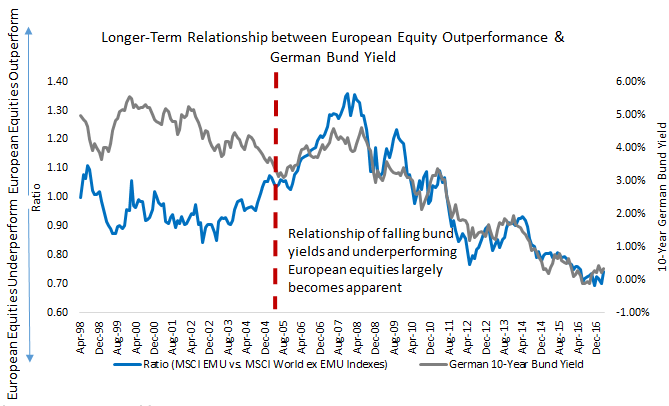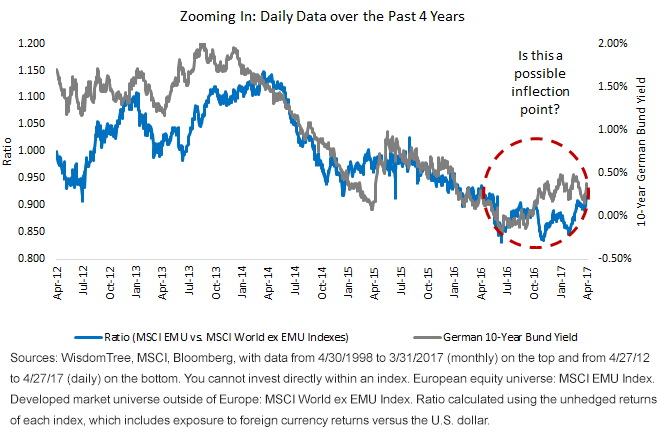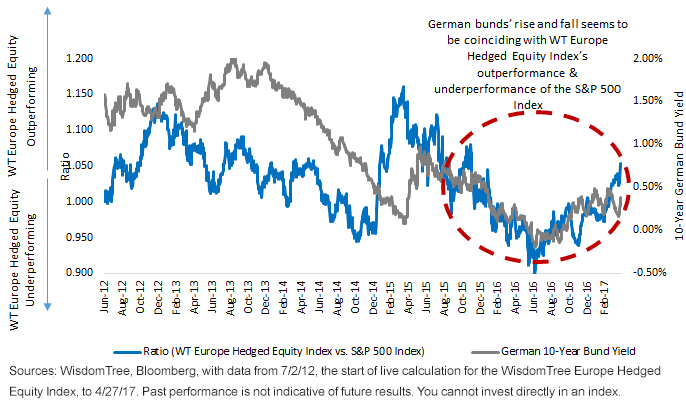Rising Bund Yields Coincide with European Outperformance


April 27, 2017: Yet another day with a central bank announcement and press conference, this time for European Central Bank (ECB) President Mario Draghi. This particular announcement and press conference was more or less a non-event as such things go, with no major shifts in policy.
However, if political risk in Europe is seen to be fading, market participants have started discussing the “abatement” of at least some of the more severe political risks in Europe—a natural consequence of which could be future ECB policy of a less “dovish” nature.
When Has Europe Outperformed? When Bund Yields Have Been Rising!
We had the pleasure of listening to a conference call from Credit Suisse on April 24, 2017, the day after the results of the first round of the French presidential election. Part of the call expressed a series of six reasons to be particularly bullish on European equities, and one of those was:
When German bund yields are rising, European equities have tended to outperform those in other developed markets.
A natural connection therefore becomes apparent. If we’re starting to think of a time when the ECB may taper its bond purchases (similar to what we saw happen in the U.S. years ago with the U.S. Federal Reserve), a consequence may be rising German bund yields—not that tall of an order considering how truly low they have been.
If we can draw out the relationship between German bunds and European equity outperformance that Credit Suisse hinted at, it therefore could make a potential case for a reallocation back into European equities leading into the fall of 2017.
Relationship Has Held Largely Since 2005 and We May Be in for an Inflection Point & Rising Bund Yields


- Since 2005, it does appear that a rising German bund yield coincided with outperformance of European equities over other developed markets. Now, it’s quite notable that a small, sharp period of this European outperformance was followed by a much longer, stronger trend of underperformance of European equities against other developed markets, which shouldn’t be surprising because a large chunk of developed markets outside of Europe would be the United States.
- Zooming in from the monthly to the daily data in order to capture more recent behavior with a finer-toothed comb, it’s clear that German 10-year bund yields have started to rise. True, it’s impossible to know if this is the beginning of a secular trend or just a short-term blip, but if the ECB truly does see a potential tapering scenario later this year, there is a factor supporting rising bund yields. The trend does appear to be holding (and responding) at least a bit out of the gate.
WisdomTree’s European Equity Experience: Poor Sentiment but Solid Performance
Now, well-established trends in investor behavior show a fairly clear picture that most market participants are well aware of: flows follow performance. We can all look back in history at the March 2009 lows on the S&P 500 Index (price level: 666), we can all look at the past few years where this index was a few hundred percent higher (price level: 2388) and near record highs.1
One of the great anomalies is that our actions clearly show that we’re much more comfortable, by and large, investing at or near record highs at greater valuation risk than we are investing at market lows, when history tells us return potential is greatest.
We cannot count how many times we’ve heard that European equities are relatively inexpensive against the U.S., but we also cannot recall many—if any at all—recent conversations where clients were itching to allocate to Europe.
When Has the WisdomTree Europe Hedged Equity Index Outperformed the S&P 500 Index? When German Yields Have Been Rising!

From about April 2015, the relationship appears quite clear. Falling German bund yields coincided with the WisdomTree Europe Hedged Equity Index underperforming the S&P 500 Index. Rising German bund yields coincided with the WisdomTree Index outperforming.
If the ECB Is Starting to Taper, It’s Time to Think about European Equities
One of the tricks to different investment theses today is trying to distill things down into relatively simple relationships. For instance, it’s easy to go down the rabbit hole of thinking about ECB policy actions, then tying those to the U.S. Federal Reserve, and then suddenly thinking about currency…and before you know it, there is just a dizzying array of data without a clear takeaway. While risk is always omnipresent with equities, if the ECB truly does start changing its language and then beginning to taper, then that is a great sign for Europe’s economic growth prospects. Our response should be: FINALLY!
This would also be a sign of a relatively strong backdrop for 1) global growth and 2) multinational companies that benefit from global growth like those in the WisdomTree Europe Hedged Equity Index.
Why Hedge the Euro if ECB Is Tapering?
WisdomTree argues that strategically hedging the euro is a way to get lower volatility when allocating to European stocks. While the ECB may start tapering its bond purchases, the Fed is clearly raising rates on a faster trajectory than the ECB, as the U.S. is further along on the policy normalization trajectory. The growing interest rate differentials between the two central banks means one is being paid to hedge the euro and something suggesting to maintain at least a partial hedge when allocating to European equities.
1Source: Bloomberg. 3/9/09 for the low, 4/27/17 for the more recent data point.
Important Risks Related to this Article
Investments focused in Europe increase the impact of events and developments associated with the region, which can adversely affect performance.Hedging can help returns when a foreign currency depreciates against the U.S. dollar, but can hurt when the foreign currency appreciates against the U.S. dollar.

Christopher Gannatti began at WisdomTree as a Research Analyst in December 2010, working directly with Jeremy Schwartz, CFA®, Director of Research. In January of 2014, he was promoted to Associate Director of Research where he was responsible to lead different groups of analysts and strategists within the broader Research team at WisdomTree. In February of 2018, Christopher was promoted to Head of Research, Europe, where he was based out of WisdomTree’s London office and was responsible for the full WisdomTree research effort within the European market, as well as supporting the UCITs platform globally. In November 2021, Christopher was promoted to Global Head of Research, now responsible for numerous communications on investment strategy globally, particularly in the thematic equity space. Christopher came to WisdomTree from Lord Abbett, where he worked for four and a half years as a Regional Consultant. He received his MBA in Quantitative Finance, Accounting, and Economics from NYU’s Stern School of Business in 2010, and he received his bachelor’s degree from Colgate University in Economics in 2006. Christopher is a holder of the Chartered Financial Analyst Designation.

